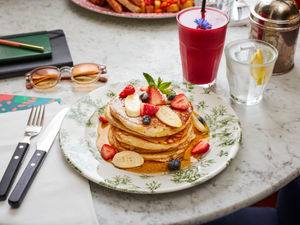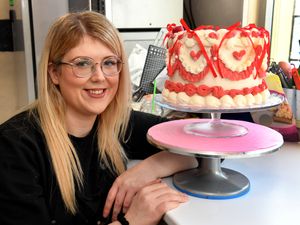Not to be sniffed at: What it's like to...Be a cheesemaker
This isn't just cheese...this is cheese destined for the shelves of M&S stores around the country.
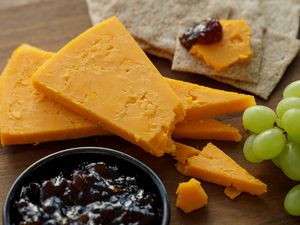
Cheese has been made at Belton Farm in Whitchurch by three generations of the Beckett family since 1922.
And for the past 40 years it has been supplying the national retailer with different varieties including its Vintage Red Fox, White Cheshire and Wensleydale.
Belton Farm has a century of experience and expertise between the cheese makers and specialises in using traditional methods that have been passed down through each generation of the family.
The family pride themselves on their provenance, professionalism and passion for making the very best tasting cheese.
All of the milk used comes from a group of dairy farmers who all live within a 25-mile radius and it's collected on a daily basis.
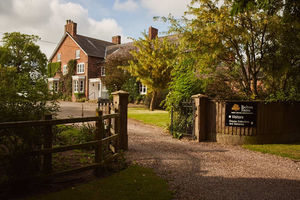
When the milk arrives at the dairy it is rigorously tested to ensure it meets the correct standards.
Once it has passed the tests it is pumped into a milk storage silo ready for the cheese making to begin.
The hard work starts very early in the morning as Justin Beckett, third-generation cheesemaker and managing director of Belton Farm explains.
"Work starts before the sun rises above Belton Farm’s 420 acres of organic arable farmland, which gained its organic status in 2002. It’s an early rise for the first cheesemaker who will begin their shift at 2.30am, adding starter cultures to the milk to help form curds and whey,"he says.
The daily cheesemaking process starts with fresh milk being collected daily from the dedicated team of local milk producers.
"Milk is then pasteurised, cooled, and put into cheese vats. When in the cheese vats, starter culture is added to the milk to kick-start the formation of curds and whey.
"Once the curds have ripened, vegetarian rennet is added to help coagulate and set the milk.
"When the curd has a firm set, it's cut and placed on the curd table where the whey is drained off.
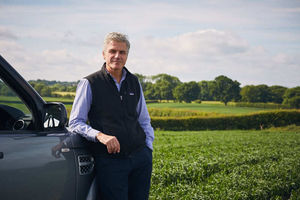
"At this point, the acidity is tested constantly by the cheesemaker. When it reaches the correct level, the curds are salted by hand. To finish, the cheese is put into wheel or block moulds and pressed for 18 hours before moving into cold storage for maturation.
"It takes around 23 hours from pasteurising to storage, before the whole process is started again," Justin tells Weekend.
The cheese is left in cold storage at a constant temperature of 8c to mature for up to 12 months.
"The watchword at Belton Farm is quality, and this applies to every area of the business and is what makes our cheese so special. Our milk comes from a dedicated group of local, family-run farms.
"We source our salt from the historic local Cheshire salt mines and our starter cultures, used to start the cheesemaking process, are bespoke and a closely guarded secret.
"Our three cheesemakers have over 100 years of experience between them and are passionate about what they do," says Justin.
All of the cheese is made to entice the taste buds, marrying unique depths of flavour with tantalising textures
"My favourite cheese is our local, award-winning speciality Cheshire, which the Beckett family have been producing at Belton Farm since 1922. This is closely followed by Red Fox, an aged red Leicester which has a delicious blend of sweet and savoury flavours with a cunningly unexpected crunch at the finish," says Justin.
Cheeses are still made in the same way as they have always been, but certain processes have adapted to meet an increase in demand over the years.
"Belton Farm still produces cheese using traditional recipes and methods handed down over generations, which to this day remains a very labour-intensive process.
"However over the years, as the amount of cheese produced has increased, some automation has been necessary.
"The farm currently makes 14 different varieties, producing over 8,000 tonnes of cheese per year.
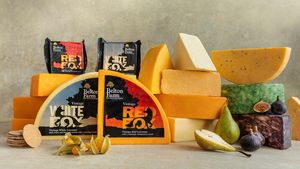
"One of my earliest memories is grading Cheshire Cheese with my father and grandfather, and the Cheshire cheese still tastes the same as it did when I first graded all those years ago," says Justin.
During lockdown it's been pretty much business as usual at Belton Farm although the team has missed having the opportunity to showcase their cheeses at the summer shows.
"Lockdown has certainly been challenging for everyone, but here at Belton Farm our key workers have been producing and packing the same great cheese throughout the lockdown period.
"One thing we have missed is going to cheese shows and the opportunity to see industry colleagues and customers. The good thing is we get to hold on to the awards and trophies for another year!," says Justin.
As Belton Farm is located on 450 acres of arable farmland, the team is committed to supporting the environment.
"In addition to cheesemaking, I am passionate about farming and conservation and as part of the Countryside Stewardship Scheme, have supported the plantation of over 15,000 native hardwood trees and new hedgerows at Belton," explains Justin.
Last year work started on planting around 400 metres of new hedgerows to maintain habitats for wildlife and birds and provide corridors for them to move about.
Justin is also proud of the firm's partnership with M&S, which has many benefits for the business.
"We have enjoyed working with M&S for over 40 years and value support from them and their customers.
"M&S continues to demonstrate a true understanding of our business and the importance of quality, true to type, handcrafted British cheese. The commitment M&S shows to our business is incredibly important to us. Over the last few months, during a time of considerable uncertainty, the success of our relationship has contributed to a steady and consistent demand for our cheese."


